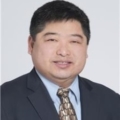Timothy Chan, MD, PhD, is a professor and attending physician at the Cleveland Clinic and the Case Comprehensive Cancer Center. He is a principal investigator of a cancer genetics laboratory and is an expert in cancer biology and immunogenomics. Dr. Chan is chair and founding director of the Center for Immunotherapy and Precision Immuno-Oncology at the Cleveland Clinic, which focuses on immunotherapy research and developmental therapeutics. He is co-director of the National Center for Regenerative Medicine.
Dr. Chan received an MD and PhD in cancer genetics, completed a residency in radiation oncology, and finished a fellowship at the Johns Hopkins School of Medicine. The Chan laboratory specializes in using genomic analysis to characterize the drivers of genetic programs underlying immunotherapy and oncogenesis. In addition, the lab has a special interest in deciphering the immunologic mechanisms underlying neurodegenerative disorders. His group studies how mutations in Parkin can cause both cancer and Parkinson’s disease.


